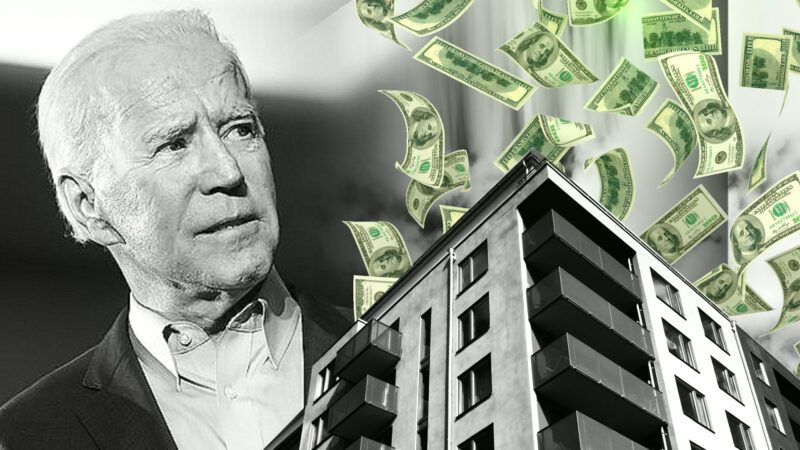Joe Biden's $2 Trillion Jobs Plan Endorses 'YIMBY Grants'
The president endorses a competitive grant program that would reward localities for loosening their restrictive zoning codes.

There's not a lot to please libertarians in President Joe Biden's $2 trillion American Jobs Plan. But one item might attract some free marketeers' support: a YIMBY ("yes in my backyard") grant program that would encourage localities to loosen restrictions on new development.
"Exclusionary zoning laws—like minimum lot sizes, mandatory parking requirements, and prohibitions on multifamily housing—have inflated housing and construction costs," explains a White House fact sheet. "President Biden is calling on Congress to enact an innovative, new competitive grant program that awards flexible and attractive funding to jurisdictions that take concrete steps to eliminate such needless barriers."
The idea of bribing localities into allowing more development is not original to the Biden administration. It has been gaining currency with lawmakers of both parties for several years now. Barack Obama's administration suggested just such a program in 2016. And Donald Trump's initial proposal for reforming fair housing regulations raised the possibility of giving extra grant money to jurisdictions that became more affordable through deregulation. (In 2020, the Trump administration reversed course and went all-in on a "save the suburbs" campaign message.)
In 2018, Sen. Elizabeth Warren (D–Mass.) introduced a housing bill that would have devoted $10 billion to rewarding areas that cut developers' red tape. Sen. Amy Klobuchar (D–Minn.) released a bill this year, co-sponsored by Sen. Rob Portman (R–Ohio), that would create a $300 million a year "YIMBY grant" program.
The bipartisan YIMBY Act, first introduced in 2019, would have required recipients of federal housing grants to report create five-year plans laying out what liberalizing land use policies they'll adopt (including such reforms as ditching minimum parking space requirements or bans on duplexes) and whether they followed through on that plan. The bill passed the House last year but stalled in the Senate.
Sen. Cory Booker (D–N.J.) has touted an even more aggressive bill, the HOME Act, that not only would have required the recipients of federal housing and transportation funding to create plans to make housing more "inclusive"; it would have stripped jurisdictions of that funding if they didn't follow through. Biden endorsed Booker's HOME Act during the campaign, though his American Jobs Program appears to be taking a softer approach. How effective that approach will really hinge on the details, including just how large any YIMBY grant program will be.
Some housing experts argued that Warren's $10 billion program would be too small to get the most restrictive jurisdictions to change their zoning laws. Klobuchar's $300 million program would obviously offer even less of an incentive.
Then again, a grant program large enough to get localities to change their zoning laws would also probably be too much additional federal spending for most libertarians to support.
There's also the question of how appropriate it is for the federal government to try to nudge jurisdictions on housing policy in the first place. The power to regulate land use is supposed to be the domain of the state and local governments. Reforms to restrictive zoning codes would ideally come from those levels of government, not from Washington.
Whether or not this particular idea has merit—and whether or not it actually makes it into the final bill—it's refreshing to see the new administration pay some attention to the ways restrictions on land use help drive up the costs of housing. It is, if nothing else, more sensible than most of the other ideas being tossed around for the American Jobs Plan.
Rent Free is a weekly newsletter from Christian Britschgi on urbanism and the fight for less regulation, more housing, more property rights, and more freedom in America's cities.


Show Comments (28)